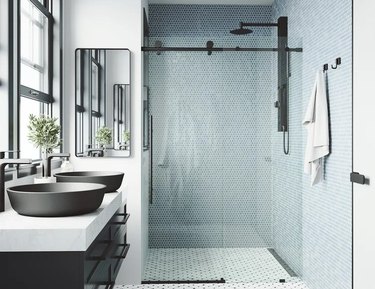When taking a cracked window in for repair, you may be surprised when the glass shop also offers plexiglass as an alternative to window glass. Both materials work well for some types of windows, clear-topped tables, or even aquariums, so it's sometimes hard to choose which to use. Ultimately, a decision may come down to how much you want to spend up front, whether the material scratches or reflects light easily, or how heavy it is.
Glass Pros and Cons
Video of the Day
The average sheet glass, such as the type used for windows, weighs quite a bit if it's large, such as on a picture window. This could make it a bit unwieldy if you're trying to maneuver the glass yourself. Dropping it could also be quite dangerous, as it's likely to shatter into shards, long spears, and tiny pieces you might not notice unless you accidentally step on or handle them.
Video of the Day
Glass usually costs less than plexiglass of similar size, which could save you some money if you're replacing window glass or the glass in a picture frame. It's also less likely to scratch, as plexiglass is easily scratched by sharp objects or even by bits of debris on a window or on a cloth as you wash the window. For a tabletop covering, for instance, a sheet of glass could be the better choice, as it's less likely to get damaged by items placed upon or moved along its surface, but it depends on the activities of the people and pets sharing your home. Glass is also easier to recycle than plexiglass, but it depends on your local recycling program. Some facilities may not take large sheets of glass, opting instead to take only glass bottles and jars, so always ask before placing other forms of glass in the recycle bin.
Plexiglass Pros and Cons
Plexiglass, sometimes called acrylic sheet, is fairly flexible when it's thin, which makes it easier to work with for some projects. It won't break if you drill holes in it, so if your DIY project requires holes of any sort, it may be a better choice than glass. It won't shatter if something bangs against it, as glass may. It's also much lighter in weight and less reflective than glass, and it's easier to cut curves through it.
Plexiglass often yellows over time, and it absorbs chemicals more easily, which means you may need to replace it sooner than glass depending on the project. In an aquarium, it's far more likely to scratch than a glass-walled aquarium, and it may be harmed or discolored by chemicals. On the other hand, it's a lot easier to make curves with plexiglass, so there are more shape options available for a sizeable aquarium when dealing with plexiglass.
